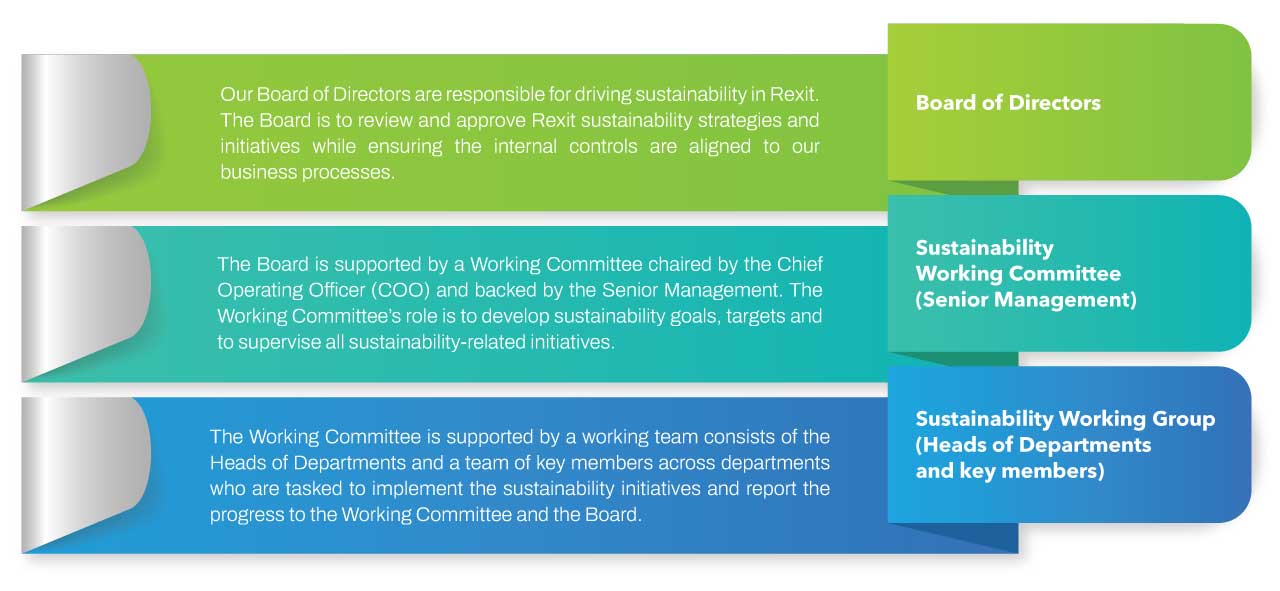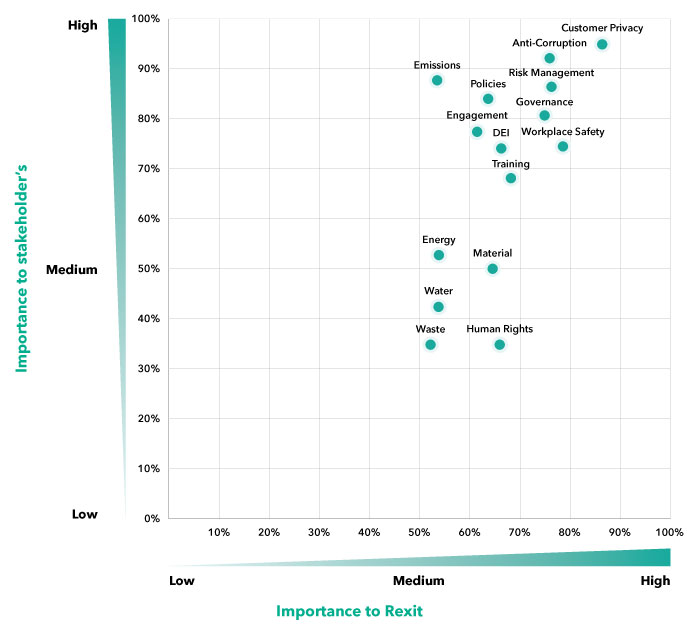Overview
Sustainable growth is prioritized through the management of economic, environmental, and social (“EES”) risks. Our strategy builds resilience against challenges like climate change and supply chain disruptions, aiming to create a strong and sustainable business model.
At Rexit, the focus is on long-term sustainability to enhance our competitive edge and create value for stakeholders in a dynamic business environment. Our Sustainability Statement and Annual Report 2024 detail our business performance and strategies for value creation. We encourage you to delve into both reports for a thorough understanding of our approach.
This statement covers Rexit sustainability performance in Malaysia for the financial year from 1st July 2023 to 31st December 2024. No historical data is available as this is our inaugural report.

Scope
This report includes all operations directly managed by Rexit. The disclosure of our sustainability-related data is based on the indicators set by Bursa Malaysia under the Sustainability Reporting Framework. We have ascertained the quality of disclosures by adherence to relevant regulatory requirements, industry standards and reporting guidelines.
All the information and data in our Sustainability Statement are from our company internal records and documents.
Sustainability Governance
Strong corporate governance serves as the cornerstone of our long-term success and sustainability. Our governance structure is designed to promote transparency, accountability, and integrity at every level of our organization. This structure ensures that we operate in the best interests of our stakeholders.

Sustainability Governance Structure

Stakeholder Engagement
Rexit maintains transparent communication on with our stakeholders to effectively understand their concerns and respond accordingly.
- Email and phone
- Social media
- Annual evaluation
- Product/service quality and support
- Customer experience
- Prices
- ESG practices and commitments
- Internal Communications
- Meetings, Townhall
- Employee Handbook
- Training and workshops
- Workplace and intranet
- Salary
- Safe workplace
- Career development
- Job satisfaction
- ESG practices and commitments e.g. human rights and workplace condition
- Annual General Meeting
- Annual Reports
- Company’s website
- Profit
- Business outlook and strategy
- Impact of government policies
- ESG practices and commitments
- Meeting
- Annual Performance
- Evaluation
- Price
- Meet contract obligations (e.g. timely payment)
- Fair procurement process
- ESG practices and commitments
- Company’s website
- Community engagements (e.g. seminars, conferences)
- Regular local community engagements
- ESG practices and commitments
- Rexit’s branding and reputation
- Employment opportunities
- Ensure company operations don’t negatively impact their quality of life
- Meetings
- Media releases
- Site visits and inspections
- Comply with the requirements
- Collaboration to improve ESG matters
- Information sharing
Materiality
Rexit had conducted a comprehensive materiality reassessment to align sustainability strategies with recent internal and external developments.
This process identified critical sustainability issues impacting the company and its stakeholders. The results guide strategic focus on prioritized EESG (Environmental, Economic, Social, and Governance) topics in planning and engaging stakeholders. Regular monitoring will track progress towards sustainability goals.
Materiality Process
Identification & categorisation
Identified key stakeholders and material sustainability topics that currently affect our stakeholders and business.
Stakeholder Engagement
Stakeholders’ needs and expectations were integrated by engaging identified groups to determine sustainability performance and disclosures.
Prioritisation
Sustainability topics were identified, consolidated, and prioritized based on their relevance to Rexit's business operations and stakeholder importance.
Validation & Approval
The Materiality Matrix was then presented to the Senior Management and Board of Directors for verification and approval.
In FYE 2024, 15 material sustainability topics were placed on the materiality matrix to show importance to Rexit and their stakeholders. We use GRI standards from the Bursa Malaysia Sustainability Reporting Guide to create a materiality matrix, prioritizing our key sustainability topics for impactful decision-making.
The sustainability issues mapped on the upper right-hand quadrant of the matrix are deemed most significant by both Rexit and our stakeholders. Rexit’s top three priority sustainability topics are Customer Privacy, Anti-Corruprion and Risk Management. The subsequent sections of this Sustainability Statement provide details about Rexit’s strategy to each material topics.
Sustainability Strategies
Rexit sustainability strategies aligns with the committed SDGs and corresponding GRI indicators.

Sustainable Economic Growth

Safeguard Environment

Workplace Empowerment

Strong Governance Structure
Summary
Rexit remains dedicated to advancing its ESG objectives, aligning corporate strategy with sustainability principles, and driving positive impact across economic with environmental, social, and governance domains. By prioritizing transparency, accountability, and innovation, Rexit aims to create long-term value for stakeholders while contributing to a sustainable future.




